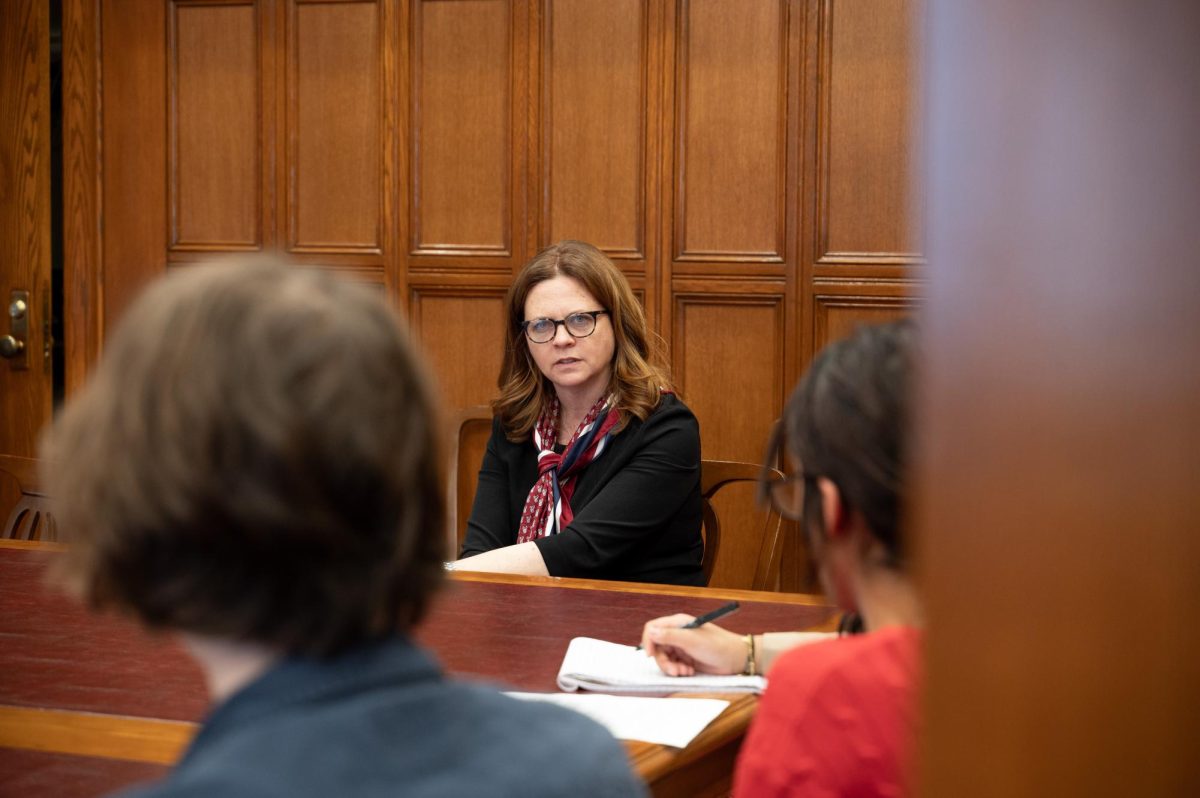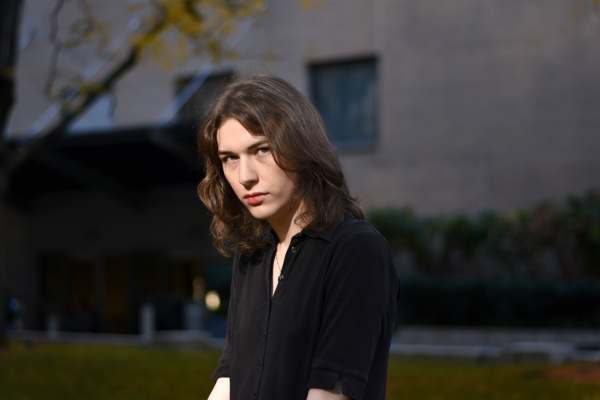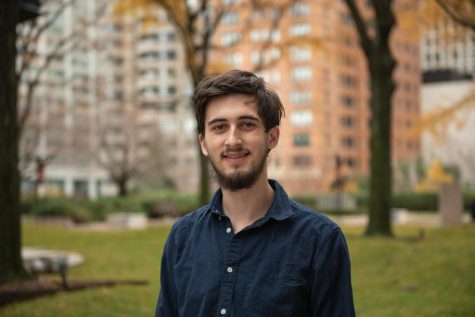University President Tania Tetlow fielded questions from student-journalists from The Fordham Observer and The Fordham Ram, the Rose Hill campus’ undergraduate news publication, on Nov. 27. She addressed a myriad of questions and topics, including the possibility for future tuition hikes, ongoing student activism in relation to the war in Gaza, and her vision for the Lincoln Center campus.
At the press conference, Tetlow said that Fordham will have to raise its tuition for the 2024-25 academic year to manage the residual impact from the COVID-19 pandemic, combat inflation and to keep up with the cost-of-living expenses for faculty members. She also spoke on the club status for Students for Justice in Palestine (SJP) at Lincoln Center, noting that Fordham will not recognize any group affiliated with the national SJP organization.
Tuition Increases
Tetlow said that one of the biggest challenges facing Fordham — and higher education in general — is the rising cost of attendance. She said that Fordham has a responsibility to keep cost of attendance feasible for lower-income families while fairly compensating faculty and staff salaries and benefits, which accounts for two-thirds of the university’s budget.
Following consecutive tuition hikes of 4% and 6% from the 2022-23 academic year and the 2023-24 academic year respectively, Tetlow said that the university must do what it can to limit future tuition hikes.
“That is what I very much worry about, that we are hitting the ceiling in this country of what American families can afford to pay for college.”Tania Tetlow, Fordham University President
“The cost of what we provide you does go up slightly over time and so that will continue, but we are trying to not repeat the 6%,” the president said, referring to the tuition increase for the 2023-24 academic year. “So, we are getting closer to modeling what it will be next year but I want to make sure it is not that high.”
The president added that the university must do all that it can to be frugal while it manages the residual impact of the COVID-19 pandemic and inflation. She said that the university strives to expand financial aid to decrease the financial burden felt by lower-income families.
“That is what I very much worry about, that we are hitting the ceiling in this country of what American families can afford to pay for college,” Tetlow said.
She noted, however, that Fordham will still have to raise tuition to keep up with inflation and cost-of-living raises for staff.
“We are trying to balance wanting very much to do right by the people who work here who are the heart and soul of the institution, while not pushing up the cost on you the students,” Tetlow said.
The university will continue to make efforts to approach financial aid allocation from an equity perspective, according to Tetlow. She said that the effective model involves increasing tuition for all students and holding back a portion of those funds to increase financial aid packages for students who cannot afford the increased cost.
“We did that last year and we are continuing to look at how can we be more careful and thoughtful because we do not want to derail any student’s career over $1,000 that they can absolutely not afford to pay because they have hit their limit,” Tetlow said.
Club Status of SJP at Fordham Lincoln Center
The president said that the university will not recognize an SJP club associated with the national SJP organization. Tetlow said that the university would recognize a Palestinian student organization, but expressed concern over national SJP’s decentralized structure.
“What we’re resisting is just the association with the national group, not the creation of a student group,” the president said.
Students at Lincoln Center have been trying to form an official SJP club since 2016, when approval of the club was vetoed by then-Dean of Lincoln Center Keith Eldridge.
SJP is a loose network of autonomous clubs that do not operate out of a central headquarters or under one spokesperson. According to the National SJP steering committee, decisions over tactics and rhetoric are at the discretion of individual chapters.
Tetlow said that decentralization makes SJP clubs unpredictable and said the National SJP’s rhetoric online could be read as inciting violence.
“When you have a new administration, someone comes in and necessarily creates a certain amount of change in their worldview.” Tania Tetlow, Fordham University President
“It is hard to pin down what stances (national SJP) actually takes but some of what has gotten posted on their social media … has been really worrisome.
As an example for concerning rhetoric from national SJP, Bob Howe, associate vice president for communications, provided an excerpt from a toolkit document distributed by the national SJP steering committee, saying that the excerpt was “inconsistent with the ethos of open, nonviolent discourse that Fordham expects and supports.”
The excerpt Howe specifically cited from the toolkit fell under the subheading “liberation is material.” The excerpt called on activists to “engage in meaningful actions that go beyond symbolism and rhetoric” and included a quote from Malcolm X.
“You don’t get freedom peacefully. Freedom is never safeguarded peacefully,” the quote from Malcolm X read. “Anyone who is depriving you of freedom isn’t deserving of a peaceful approach by the ones who are deprived of their freedom.”
In the absence of an official club at the Lincoln Center campus for Palestinian students, Tetlow said Campus Ministry was accelerating its search for a rabbi and an imam to support Jewish and Muslim students at Fordham. She added that Campus Ministry’s role in providing support for nonreligious students will also be expanded.
“The full time chaplains will very much be there for (Jewish and Muslim) communities whether people are actually religious or not,” Tetlow said. “It will be the person charged with thinking on a full time basis about not just the spiritual needs but the broader needs of each community.”
“It is hard to pin down what stances (national SJP) actually takes but some of what has gotten posted on their social media … has been really worrisome.Tania Tetlow, Fordham University President
Administrative Retention
Since the 2022-23 academic year, three administrators have stepped down from their roles at Fordham, including Fordham’s inaugural Chief Diversity Officer Rafael Zapata at the end of September, and Former Dean of Faculty of Arts and Sciences Eva Badowska and Former Senior Vice President of Student Affairs Jeffrey Gray, both of whom concluded their tenure at the end of the 2022-23 academic year.
Tetlow attributed the departures of university administrators in the past year to a natural end in tenure as well as the expected turnover following a change in university leadership.
“When you have a new administration, someone comes in and necessarily creates a certain amount of change in their worldview,” Tetlow said. “Some people are thrilled by that, and for some folks that’s kind of not what they signed up for.”
The president added that an additional reason is that some individuals may have wanted to complete the term under her predecessor before deciding to retire. She did not cite any unified reason for the departures but welcomed an opportunity to bring fresh eyes to Fordham’s operations.
New Developments across Rose Hill and Lincoln Center
The president spoke on making serious considerations regarding the Lincoln Center campus as well as “activating different spaces.” While the university has announced an expansion for the Joseph M. McShane, S.J. Campus Center and a renovated Marketplace on the Rose Hill campus, no new developments for the Lincoln Center campus have been announced since the expansion of the McMahon RamFit Center at the beginning of this year.
According to Tetlow, conversations focused on the Lincoln Center campus included creating a more engaged classroom and more communal spaces.
Tetlow signaled rough plans to repurpose the QuinnX Library space as one of these communal student spaces, which was closed this fall due to budget cuts. She suggested that books currently in storage at QuinnX could be stored off site and accessible by request.
“We could store those books off site and be able to get them in 24 hours notice without needing to take up space at the center of campus in that way,” Tetlow said.
The president did not indicate that any specific plans for renovations on the Lincoln Center campus existed.
Stevie Fusco contributed additional reporting to this piece.




